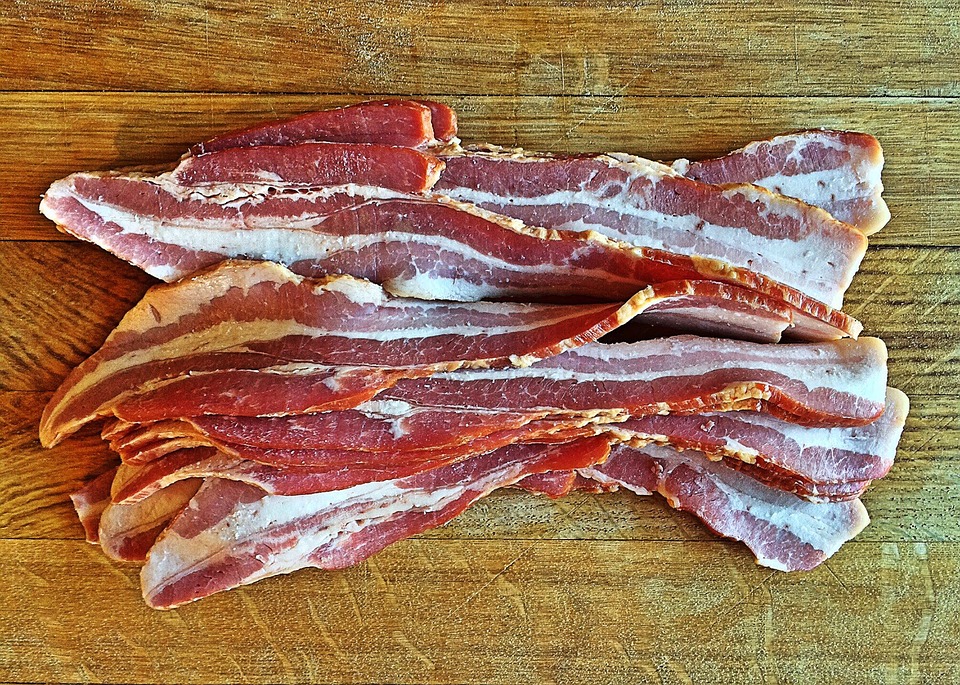Untranslatable German Words: Kummerspeck and Frustfressen Posted by Constanze on Feb 9, 2015 in Food, Language
Guten Tag, and Willkommen to another edition of untranslatable German words!
Today the word I’m going to break down for you is Der Kummerspeck.
What does Kummerspeck mean?
Kummerspeck is the name for excess fat gained by emotional eating – specifically, the excessive eating people do in times of stress or sorrow.
What does Kummerspeck literally translate to?
This compound noun consists of two words. The first is der Kummer, which refers to emotional pains like concern, worry, sorrow or anxiety. The second is der Speck, which can either mean ‘bacon’ or ‘fat’. For instance, the word Babyspeck means ‘baby fat’, and Winterspeck means ‘winter fat’, while Frühstücksspeck refers to the Speck (bacon) you eat for Frühstück (breakfast). Most translations you’ll see of Kummerspeck say it means ‘grief bacon’. This is one, possible translation, but since the word refers to the fat itself (not the food eaten to make you fat), it is more likely to translate to something like ‘grief fat’ or ‘sorrow fat’. However, Speck is different to the German words Fett (fat: noun), fett (fat: adjective), and dick (fat: adjective) because it refers to the fat found in meat – which is probably where the translation ‘grief bacon’ comes from.

Related to the noun der Kummer is the verb kümmern, which is a difficult verb to translate. To kümmer yourself with something is to concern yourself with it, take care of it, or otherwise attend to/see to it. But there is often an element of worry to it. Here are some examples of the verb kümmern in use:
Wer kümmert sich um die Hausarbeit? – Who’s seeing to the housework?
Kümmere dich um das nicht – Don’t concern yourself with/about that
Ich muss mich um die Kinder kümmern – I need to see to the kids
Perhaps the word Kummerspeck refers to the fat gained by eating when we are overly concerned with something/someone.
How would you use Kummerspeck in a sentence?
Here’s an example from a headline in the Hamburger Abendblatt : Kummerspeck nach Ehe-Aus: Heidi Klum hat zugenommen (‘Sorrow Fat following marriage breakup: Heidi Klum has put on weight’)
What is the nearest equivalent English word?
There isn’t a word that I know of to describe the fat itself, although the process is often called ‘emotional eating’ or ‘emotional over-eating’. Since we’re dealing with Speck (bacon), though, there is an English, food-related phrase used to describe cellulite on the legs: Cottage cheese thighs!
So if Kummerspeck refers to the fat itself, is there a German word for the process of emotional eating, too? Of course there is.
Das Frustfressen
What does Frustfressen mean?
Excessive eating brought about by frustration.
What does Frustfressen literally translate to?
Frustfressen is made up of two words. Der Frust, which means ‘frustration’, and fressen, which is a version of ‘essen’ (to eat), usually used to describe animals eating, but can also be used to describe a person stuffing their face with food. For example: Er frisst wie ein Schwein – He eats (stuff his face) like a pig.
How would you use Frustfressen in a sentence?
Wie höre ich das Frustfressen auf? – How do I stop emotional over-eating?
What’s the nearest English equivalent word?
There is no single word, but ‘emotional eating’ is an appropriate translation.
As always, I hope you enjoyed this, and I hope you learnt something from it! Any questions, comments or alternative translations are always welcome.
Bis später,
Constanze x

Build vocabulary, practice pronunciation, and more with Transparent Language Online. Available anytime, anywhere, on any device.
About the Author: Constanze
Servus! I'm Constanze and I live in the UK. I'm half English and half German, and have been writing about German language and culture on this blog since 2014. I am also a fitness instructor & personal trainer.





Comments:
ana jacinto:
Ich habe Deutsche sehr sehr gern! Deshalb bin ich seh bereit neue Woerter zu lernen.
Und ich lese Ihre Texte mit viel Interesse!
Constanze:
@ana jacinto Das freut mich sehr! Vielen Dank, Ana! 😀
Allan Mahnke:
These are so great! Vielen Dank! I had always wrongly attributed the first syllable of frustfressen. You are right! It expresses frustration. I had the Latin word “frustum” in the back of my head. It means a fragment or scrap of food. In my head I had someone with “munchies” who scours the kitchen for any crumb that he or she might “gobble.” (I don’t know if “gobble” means the same in English as it does in American.) I ended up in the right place, but for the wrong reason! Many, many thanks!
Allan
Constanze:
@Allan Mahnke Hi, Allan! Well, now I’ve learnt something, too! Maybe there’s a link there, anyway? And yes, ‘gobble’ does mean the same in English. Glad you enjoyed the post. 🙂
Constanze